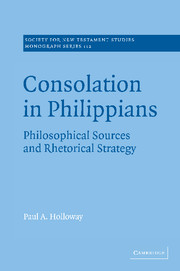Book contents
- Frontmatter
- Contents
- Acknowledgments
- Abbreviations
- Introduction
- Part I Literary and rhetorical contexts
- 1 The integrity of Philippians
- 2 The rhetorical situation of Philippians
- 3 On the genre of Philippians: ancient consolation
- Part II Consolation in Philippians
- Conclusion: an analysis of Philippians
- Bibliography
- Index of modern authors
- Index of passages cited
2 - The rhetorical situation of Philippians
Published online by Cambridge University Press: 06 October 2009
- Frontmatter
- Contents
- Acknowledgments
- Abbreviations
- Introduction
- Part I Literary and rhetorical contexts
- 1 The integrity of Philippians
- 2 The rhetorical situation of Philippians
- 3 On the genre of Philippians: ancient consolation
- Part II Consolation in Philippians
- Conclusion: an analysis of Philippians
- Bibliography
- Index of modern authors
- Index of passages cited
Summary
Let rhetoric be defined as the art of perceiving the available means of persuasion in any given situation.
Aristotle, Ars rhet. 1.2.1Letters are to be composed from those types that are always fitted to the situation.
Ps.-Demetrius, Epist. Types, praef.To say, as many New Testament scholars now do, that Paul's letters must be studied in light of their respective rhetorical situations is to do more than simply repeat Historical Criticism's familiar creed that documents rooted in a specific historical context can be understood only in reference to that context. It is to say, rather, that Paul's letters were written in response to specific situations (the nature of which I will attempt to define below) and that each letter stands in relation to its situation in much the same way that an answer exists relative to a question or a solution to a problem. Furthermore, it is to say that a fairly detailed description of this generative situation is an early and important step in any critical study of a Pauline letter. In this chapter I will attempt to reconstruct the rhetorical situation of Philippians. Such a reconstruction is, of course, a work of synthesis that can exist only in dialogue with the more detailed exegetical analysis of the letter. As far as possible I will try to indicate the exegetical basis of my reconstruction; at times, however, I will refer to the exegetical chapters in part II below. I begin with a few theoretical considerations.
The rhetorical situation: some theoretical observations
Bitzer's theory of the rhetorical situation
The current emphasis on the rhetorical situation in Pauline studies derives from the theoretical work of Lloyd Bitzer whose programmatic essay, “The Rhetorical Situation,” articulates a theory of “rhetoric-as-essentially-related-to-situation.”
- Type
- Chapter
- Information
- Consolation in PhilippiansPhilosophical Sources and Rhetorical Strategy, pp. 34 - 54Publisher: Cambridge University PressPrint publication year: 2001



